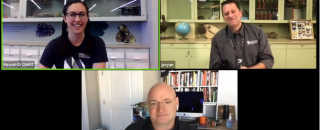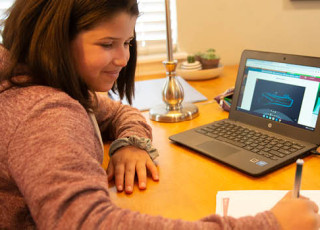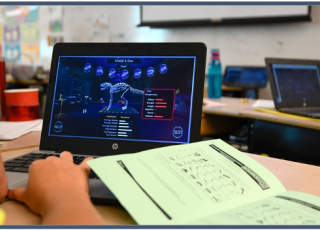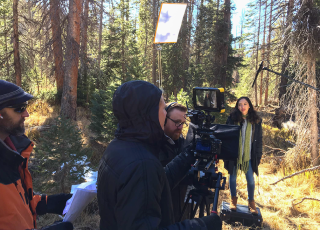Over 10,000 Around the World Tuned in for The Natural History Museum of Utah’s Live Q&A with Astronaut and Author Scott Kelly on Research Quest Live Last Week
April 28, 2020 – The Natural History Museum of Utah (NHMU) hosted a free, live Q&A session with astronaut Scott Kelly on Research Quest Live last Friday. More than ten thousand users tuned in from around the world. With three times as many users as other live sessions, the museum’s special Research Quest Live event brought in more than 2,200 questions in less than an hour from listeners in countries including South Korea, Philippines, United Kingdom, Portugal, Belgium, Bulgaria and 29 other countries in Europe.
“We are thrilled to have had the opportunity to bring Scott onto Research Quest Live. We enjoyed this timely and fascinating discussion on his time in space with so many around the world,” said Jason Cryan, executive director of NHMU. “At a time when we are all dealing with different challenges, Scott’s encouragement to continue to be problem-solvers, lifelong learners, and committed to reaching out and working together resonated with many listeners. We hope people around the world will continue to tune into upcoming Research Quest Live sessions.”
In the United States, users joined from 46 states, Puerto Rico and the District of Columbia, with half coming from Utah. More than one thousand questions came from students in Utah who have been following along with Research Quest Live for the past six weeks while schools have been out.
Comments came from around the world during the Q&A. Arianna from Italy said “Hello everyone! I just wanted to thank you for this magnificent opportunity, to follow the live from here, the other side of the world. That's what technology does, that's the power of science. From a scientist, to other scientists, thank you all. And thanks to Scott Kelly for being an inspiration to all of us too. ”
While Ivonne, a Utah resident, commented “This was awesome!!! Watched (Research Quest Live) for the first time with Scott Kelly from Utah while my 15-year-old son watched from Texas, and we both thought it was so cool to be able to watch together. Very appropriate to what we are experiencing with the pandemic. Thank you NHMU!!!”
Kelly, who holds the record for the single-longest space flight mission of 340 days, spoke on the importance of using time in quarantine wisely and cultivating critical-thinking and decision-making skills while also keeping up with homework. He inspired students to not treat this time as a break from learning, but to use it as a way to find out what inspires them as individuals and to use that motivation to find a career they will love for their entire life.
Led by science educators and featuring scientists who are experts in their field, students learn and participate in a variety of real-life scientific research questions across various fields such as paleontology, biodiversity, ecology and more. Each weekday the museum hosts live classes at 9:30 AM MDT. Each class is followed by live Q&A with NHMU scientists and colleagues whose research and work relates to Research Quest investigations. Students who are unable to tune in to the live sessions can access them through the on-demand classes. In all, Research Quest has seen a notable reach across the globe, with data showing usage in 56 countries, 1,175 cities world-wide, all 50 U.S. states and in 962 U.S. cities.
To see Scott Kelly’s full Q&A session, visit nhmu.utah.edu/research-quest/on-demand-qa-scott-kelly.
To learn more and sign up for future Research Quest Live sessions, visit nhmu.utah.edu/RQ.
###
About the Natural History Museum of Utah:
The Natural History Museum of Utah is one of the leading scientific research and cultural institutions in the country. Established in 1963, the Museum’s collections contain over 1.6 million objects and offers innovative exhibitions and educational programs to thousands of residents and visitors each year, including traveling and permanent exhibits, special events and other programs. With an expected attendance of 300,000 visitors a year, the Museum also offers a variety of outreach programs to communities and schools throughout Utah, reaching every school district in the state annually. The Museum has an active science program with more than 30 scientists and 10 field exhibitions each year.
About Research Quest:
First envisioned in 2014 by a coalition of teachers and learning specialists, as well as scientific and digital experts, and made possible with the invaluable support of generous funders, the first Research Quest module, consisting of three investigations, debuted in Utah schools in January of 2016. Since then, 500 teachers and their students have logged in more than 140,000 times and have used the resource in their classrooms to help meet a range of education standards including advance critical thinking.
Research Quest is made possible with generous support from the Joseph and Evelyn Rosenblatt Charitable Fund and the IJ and Jeanné Wagner Foundation. Their ongoing support, combined with a generous grant from the Utah Department of Workforce Services’ Utah Cluster Acceleration Partnership program, funding from the Utah State Legislature’s Informal Science Education Enhancement program, and a grant from the National Science Foundation, has allowed Research Quest to become a valued teaching resource for teachers and students throughout Utah and in states nationwide.
About Scott Kelly:
Scott Kelly is a retired American astronaut and United States Navy Captain, U.S. spaceflight record holder and an experienced test pilot having logged more than 15,000 hours of flight time in more than 40 different aircraft and spacecraft. A former fighter pilot, Kelly flew the F-14 Tomcat aboard the aircraft carrier, USS Dwight D. Eisenhower.
Kelly was selected by NASA as an astronaut in 1996. A veteran of four space flights, he piloted Space Shuttle Discovery to the Hubble space telescope in 1999 and, subsequently, commanded Space Shuttle Endeavor on a mission to the International Space Station in 2007. His long-duration space flight experience includes two flights on the Russian Soyuz spacecraft, launching and landing from Kazakhstan and two stays aboard the International Space Station as commander, the first a 159-day mission in 2010-2011 followed by his recorded-breaking 340-day mission to the ISS in 2015. During his yearlong mission, known worldwide as the “Year In Space,” he conducted three spacewalks before returning home in March 2016. Kelly has traveled more than 200 million miles, which is more than twice the distance to the sun and has orbited the earth more than 8,300 times.
Press contacts and links
-
Press Contact
Margaret Chamberlain
Public Relations Specialist



